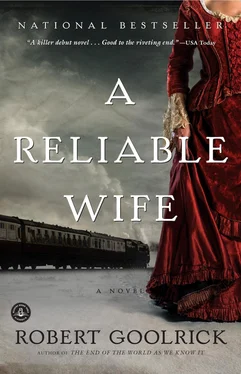Robert Goolrick - A Reliable Wife
Здесь есть возможность читать онлайн «Robert Goolrick - A Reliable Wife» весь текст электронной книги совершенно бесплатно (целиком полную версию без сокращений). В некоторых случаях можно слушать аудио, скачать через торрент в формате fb2 и присутствует краткое содержание. Жанр: Триллер, на английском языке. Описание произведения, (предисловие) а так же отзывы посетителей доступны на портале библиотеки ЛибКат.
- Название:A Reliable Wife
- Автор:
- Жанр:
- Год:неизвестен
- ISBN:нет данных
- Рейтинг книги:3 / 5. Голосов: 1
-
Избранное:Добавить в избранное
- Отзывы:
-
Ваша оценка:
- 60
- 1
- 2
- 3
- 4
- 5
A Reliable Wife: краткое содержание, описание и аннотация
Предлагаем к чтению аннотацию, описание, краткое содержание или предисловие (зависит от того, что написал сам автор книги «A Reliable Wife»). Если вы не нашли необходимую информацию о книге — напишите в комментариях, мы постараемся отыскать её.
A Reliable Wife — читать онлайн бесплатно полную книгу (весь текст) целиком
Ниже представлен текст книги, разбитый по страницам. Система сохранения места последней прочитанной страницы, позволяет с удобством читать онлайн бесплатно книгу «A Reliable Wife», без необходимости каждый раз заново искать на чём Вы остановились. Поставьте закладку, и сможете в любой момент перейти на страницу, на которой закончили чтение.
Интервал:
Закладка:
Truitt had seen her in a new way. And his vision had made her over, had caused her to turn into the kind of woman he wanted. He deserved no less. Catherine, for her part, had led a life in which kindness was neither expected nor given. Battered as she was, she didn’t know the difference between happiness and dread. She didn’t know the difference between excitement and fear. She felt a knot in her stomach every hour of the day and didn’t know what to call it. Her hands shook. She vomited in the mornings, in secret, but she felt that, finally, the end of the tightrope was in view, that the slamming doors and the hostile, mercantile sex and the demented nights in the opium dens were behind her.
She had been adept at the beginning and the ends of things, and now she saw that whatever pleasures life had to offer lay in the middle. She could find some peace there.
Then one day he could speak, his voice no longer a harsh and burning rasp. Then one day he could walk, could dress himself, could carry on a conversation, could imagine going back to work to repair his fortunes, to meet the anxious eyes of the town that depended on his being well. He was changed, of course. He walked like an old man, as though each step were a learned and torturous act. His hair had turned stark gray. When he drank from his glass of brandy, his hand moved to his mouth in a series of distinct, static movements, like flashing photographs.
They sat at the dinner table. He had asked for beef and potatoes and pudding, the food from his schoolboy days. He was reading her the daily disasters from the paper as they ate.
His fork clattered on the plate when a knock came at the big front door. It was far away, and Catherine offered to go, but Ralph was already on his feet, unsteady.
“No. I want to go.”
He walked the long way, lighting every light as he went. He opened one of the big double doors, and a man stood on the terrace in the darkness, looking out over the steps and the snow. He turned, and Ralph could make out his shape, but could barely see his face.
The man held out his hand. “I am Tony Moretti,” he said. And then, after a pause, “I am your son.”
And even though they both knew what the man said was a fiction, Ralph stepped into the dark and opened his arms.
CHAPTER TWENTY-ONE
Sons came home to their fathers, even to men who weren’t their fathers, men who had beaten them senseless. Sons came home, malevolent with revenge, home to fathers who could not forgive themselves for the cruelties they had committed. Such things happened.
He had brought everything he owned, the fancy suits, the extravagant Paris neckties, the pristine shirts and the silver-headed walking stick and amber colognes from London. He was penniless. He was like a swan, long-necked and useless except for beauty, and everything he did, every gesture he made and every word he spoke seemed out of place, too exotic, too mannered. He played the piano after dinner, and even that seemed excessive, as though he were playing for a fancy crowd in a rococo concert hall. Truitt preferred Catherine’s simplicity of feeling, her lack of expertise.
Catherine and Truitt lay in the big bed in their blue bedroom. Antonio slept far away from them, in a bachelor apartment he had devised out of his mother’s old rooms. A dressing room. A magnificent sitting room for which he had taken bits of furniture from all over the house, for which Truitt had ordered an ebony piano. And a bedroom, which was large and grand and hung with tapestries.
They could feel his eyes on them in the dark. A new quiet had entered into the way they treated each other, a simplicity of manner. It was, Catherine supposed, love. It was what normal people had when passion had run its course. They spoke quietly after making love. They spoke of small matters, his business, Mrs. Larsen and her silent sorrow, the husband she would never see again, his care paid for by Truitt, the garden for which the plants were arriving daily. They never spoke of Truitt’s illness, as though it had never happened.
“He reminds me so much of Emilia. Her eyes and mouth, that dark hair. An Italian.”
Catherine sat up in bed and stared at the pale light of the new moon coming through the window.
“How did she die?”
She could feel his stillness beside her. He remained weak, and continued to have moments when he did not know where he was or who she was or where they lived. His body was covered with scars, a silent reminder of her iniquities and her consolations and his forgiveness.
“I killed her.”
The moon seemed so far away. The winter had been so long, she could not remember a time when it had not been winter. She could not remember her life before she stepped down from the train and into the gaze of Ralph Truitt. Would not remember or want to, except for the presence of Antonio, moving like a cat through the house, watching her day and night.
“I can’t believe it. I don’t.”
Truitt sat up in bed and took her hand. “I will talk about this one time. When I’ve told it all, her name will never be said in this house again. I killed her. I let her die.
“She had moved to Chicago with Moretti. She was my wife. There was no divorce, no legal recourse. She was a Catholic and they don’t do that. I had her child, her boy, under my roof and she was my wife and I felt pain every time I thought about her, but I always knew where she was, I heard the stories. Everybody in town heard the stories and I was ashamed, but I went on and nobody, of course nobody spoke about it, at least not to me.
“I sent her money. She wasn’t destitute. I sent her money and she lived in a style that was despicable to me, but I sent it anyway because she was my wife, because I was haunted by Franny and had her boy and because… because I couldn’t let her live in squalor.
“Moretti left her. Left her for some rich widow with a big house and a blind eye to his infidelities and his affectations and his lack of talent or charm. Emilia…” She could hear the pain in his voice as he spoke her name. “Emilia took a series of lovers, each young, each useless, going around Chicago saying he had had a countess, a real countess, and describing in beer halls the things she was willing to do. She was still beautiful.
“She never wrote to Antonio. She never came to see the grave of her daughter. She could have chosen differently. She could have chosen something other than this parade of young ne’er-do-wells, something with kindness, something with honor, a house where she might have brought her boy and raised him up. She had money. She was intelligent. She was cultivated. She slept with women, I heard. She got drunk in public. She was robbed twice. By men she knew, men who had been guests in her house.
“I went to see her. Several times. Not to ask her back home, I wouldn’t have her here. I asked her to stop. Just to stop it. She laughed in my face. She threw wine at me. She told me I disgusted her.”
He took her hand and kissed it. “Do you need to know the rest?”
The moonlight was so faint and cold, her skin rippled with the cold. “I need to know.”
“She got sick. Consumption, they called it then. Tuberculosis, I suppose. I sent doctors. I didn’t want to see her. She was still so young. She had tuberculosis, they said, she had syphilis, she had gone mad with it, and no man or woman would come near her. Her name was up, as people say, in the streets of Chicago, and no one would come to comfort her, all those dinner parties she had given, all those men she had given a moment’s pleasure to, and money, endless amounts of money to show off the affectations of the Countess Emilia. She could still barely speak English. The doctors couldn’t do anything. She lived alone and there was no one to feed her or clean up after her, and she had never learned to do the first thing for herself.
Читать дальшеИнтервал:
Закладка:
Похожие книги на «A Reliable Wife»
Представляем Вашему вниманию похожие книги на «A Reliable Wife» списком для выбора. Мы отобрали схожую по названию и смыслу литературу в надежде предоставить читателям больше вариантов отыскать новые, интересные, ещё непрочитанные произведения.
Обсуждение, отзывы о книге «A Reliable Wife» и просто собственные мнения читателей. Оставьте ваши комментарии, напишите, что Вы думаете о произведении, его смысле или главных героях. Укажите что конкретно понравилось, а что нет, и почему Вы так считаете.












